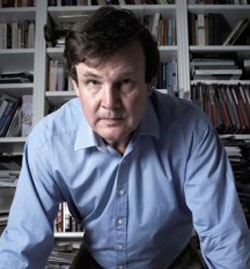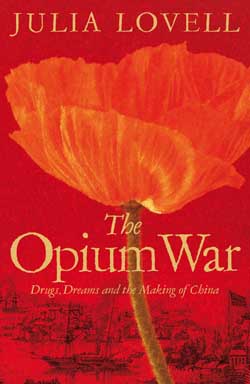Posted on February 28, 2012 by The Orwell Prize -

In the past decade Pakistan has become a country of immense importance to its region, the United States, and the world. With almost 200 million people, a 500,000-man army, nuclear weapons, and a large diaspora in Britain and North America, Pakistan is central to the hopes of jihadis and the fears of their enemies. Yet the greatest short-term threat to Pakistan is not Islamist insurgency as such, but the actions of the United States, and the greatest long-term threat is ecological change. Anatol Lieven’s book is a magisterial investigation of this highly complex and often poorly understood country: its regions, ethnicities, competing religious traditions, varied social landscapes, deep political tensions, and historical patterns of violence; but also its surprising underlying stability, rooted in kinship, patronage, and the power of entrenched local elites. Engagingly written, combining history and profound analysis with reportage from Lieven’s extensive travels as a journalist and academic, Pakistan: A Hard Country is both utterly compelling and deeply revealing. Taken from Public Affairs Books
Posted on February 28, 2012 by The Orwell Prize -

Established as one of the most influential political commentators in the country, Steve Richards became The Independent’s chief political commentator in 2000 having been political editor of the New Statesman. He presents GMTV’s flagship current affairs show The Sunday Programme and Radio 4’s Week in Westminster. Submitted articles The man who should speak remains silent Let the people decide. Unless we decide not to Demanding Theresa May’s head on a plate solves nothing The Sceptics’ rage over Europe is a proxy battle Politicians are finally free from Murdoch’s tyranny Can the big society work? Other links Steve Richards on Journalisted Steve Richards on Twitter
Posted on February 28, 2012 by The Orwell Prize -

Lucie Blackman – tall, blonde, and twenty-one years old – stepped out into the vastness of Tokyo in the summer of 2000, and disappeared forever. The following winter, her dismembered remains were found buried in a seaside cave. The seven months in between had seen a massive search for the missing girl, involving Japanese policemen, British private detectives, Australian dowsers and Lucie’s desperate, but bitterly divided, parents. As the case unfolded, it drew the attention of prime ministers and sado-masochists, ambassadors and con-men, and reporters from across the world. Had Lucie been abducted by a religious cult, or snatched by human traffickers? Who was the mysterious man she had gone to meet? And what did her work, as a ‘hostess’ in the notorious Roppongi district of Tokyo, really involve? Richard Lloyd Parry, an award-winning foreign correspondent, has followed the case since Lucie’s disappearance. Over the course of a decade, he has travelled to four continents to interview those caught up in the story, fought off a legal attack in the Japanese courts, and worked undercover as a barman in a Roppongi strip club. He has talked exhaustively to Lucie’s friends and family and won unique access to the Japanese detectives who investigated the case. And he has delved into the mind and background of the man accused of the crime – Joji Obara, described by the judge as ‘unprecedented and extremely evil’. With the finesse of a novelist, he reveals the astonishing truth about Lucie and her fate.People Who Eat Darkness is, by turns, a non-fiction thriller, a courtroom drama and the biography of both a victim and a killer. It is the story of a young woman who fell prey to unspeakabale evil, and of a loving family torn apart by grief. And it is a fascinating insight into one of the world’s most baffling and mysterious societies, a light shone into dark corners of Japan that the rest of the world has never glimpsed before. Taken from Random House Group
Posted on February 28, 2012 by The Orwell Prize -

In my own words… Truth? Beauty? Call it what you like mate, I just call it a blogging. This site exploded on to the web scene in late 2009. And it been gettin’ better every day yeah. I’ve published a bloody book for god sake (2 sales so far, many more predicted and expected). Whirlwind internet successes do no get much bigger than this. No, but seriously, I’m a computer programmer for one of the largest solar panel manufacturers in the South East (based out of Guildford). I mainly blog about technical issues/philosophy/art etc. I do not exist. Taken from Another stupid human
Submitted posts
Other links
Raph Shirley on Twitter
Posted on February 28, 2012 by The Orwell Prize -

On an icy dawn morning in Paris in January 1943, 230 French women resisters were rounded up from the Gestapo detention camps and sent on a train to Auschwitz – the only train, in the four years of German occupation, to take women of the resistance to a death camp.The youngest was a schoolgirl of 15, the eldest a farmer’s wife of 68; there were among them teachers, biochemists, sales girls, secretaries, housewives and university lecturers. Caroline Moorehead’s remarkable new book is the story of these women – the first time it has been told.It is about who they were, how and why they joined the resistance, how they were captured and treated by the French police and the Gestapo, their journey to Auschwitz and their daily life in the death camps – and about what it was like for the 49 survivors when they returned to France. Six of the women were still alive in 2010 and able to tell their stories. What they had to say – and this was confirmed by the children of those who died – was that great affection and camaraderie grew up among the group. They became friends, and it was precisely this friendship that kept so many of them alive.They supported and cared for one another, worked together, shared everything, watched out for each other and faced the horror together.Friendship, almost as much as luck, dictated survival. Drawing on interviews with survivors and their families, on German, French and Polish archives, and on documents held by WW2 resistance organisations, A Train in Winter covers a harrowing part of our history but is, ultimately, a portrait of ordinary people, of bravery and endurance, and of the particular qualities of female friendship. Taken from Vintage Books
Posted on February 28, 2012 by The Orwell Prize -

Longlisted for articles published by The Spectator and Daily Telegraph and broadcast by Channel 4 Peter Oborne is a journalist and author who joined The Telegraph in 2010 after writing for some years for the Daily Mail. He has also written for Prospect, The Observer, The Independent, the Evening Standard and the Sunday Mirror. His books include The Rise of Political Lying and The Triumph of the Political Class, and biographies of Alastair Campbell and Basil D’Oliveira, the latter being named the William Hill Sports Book of the Year 2004.
Submitted articles The great euro swindle What the papers won’t say The moral decay of our society is as bad at the top as the bottom Baroness Warsi was right to speak out: Hatred of Muslims is one of the last bastions of British bigotry Russia: Vlad’s Army Other links Peter Oborne on Journalisted
Posted on February 28, 2012 by The Orwell Prize -

Polly Curtis is the Guardian‘s Whitehall correspondent working in Houses of Parliament and writing about government, politics and policy. She has previously covered health, social affairs and education for the paper and is currently seconded to write Reality check, a daily blog fact-checking the biggest news stories of the day Taken from The Guardian
Submitted posts
Posted on February 28, 2012 by The Orwell Prize -

‘On the outside, [the foreigners] seem intractable, but inside they are cowardly. . . Although there have been a few ups-and-downs, the situation as a whole is under control.’ In October 1839, a few months after the Chinese Imperial Commissioner, Lin Zexu, dispatched these confident words to his emperor, a cabinet meeting in Windsor voted to fight Britain’s first Opium War (1839-42) with China. The conflict turned out to be rich in tragicomedy: in bureaucratic fumblings, military missteps, political opportunism and collaboration. Yet over the past 170 years, this strange tale of misunderstanding, incompetence and compromise has become the founding myth of modern Chinese nationalism: the start of China’s heroic struggle against a Western conspiracy to destroy the country with opium and gunboat diplomacy. Beginning with the dramas of the war itself, Julia Lovell explores its causes and consequences and, through this larger narrative, interweaves the curious stories of opium’s promoters and attackers.The Opium War is both the story of modern China – starting from this first conflict with the West – and an analysis of the country’s contemporary self-image. It explores how China’s national myths mould its interactions with the outside world, how public memory is spun to serve the present; and how delusion and prejudice have bedevilled its relationship with the modern West. Taken from Pan Macmillan
Posted on February 28, 2012 by The Orwell Prize -

Bringing you the story that Scottish journalists seem unable to do. Taken from Rangers Tax-Case
Submitted posts
- What is Rangers’ tax case all about? – Rangers Tax Case, 28/03/11
- Lies, damned lies, and Scottish football journalism – Rangers Tax Case, 29/03/11
- The Other Rangers Tax Case – Rangers Tax Case, 01/04/11
- Alastair Johnston Confirms The RangersTaxCase Truth – Rangers Tax Case, 02/04/11
- Rangers’ Expert Advice – Rangers Tax Case, 04/04/11
- Rangers Knew About Other Tax Bill – Rangers Tax Case, 06/04/11
- Making sense of nonsense – Rangers Tax Case, 26/04/11
- The deceptive Craig Whyte – Rangers Tax Case, 25/05/11
- Credit Where Credit Is Due – Rangers Tax Case, 14/08/11
- Martin Bain, His lawyers, Rangers & Insolvency – Rangers Tax Case, 10/09/11
Posted on February 28, 2012 by The Orwell Prize -

One hundred and eight rounds of bullets. Fourteen dead. Fourteen wounded. Two sides to a story and a four-decade search for the truth… It was meant to be a peaceful march. But on the afternoon of 30 January 1972 in the City of Derry a riot started, the army went in and firing began. ‘Bloody Sunday’ became a catalyst for three more decades of violence. In 1998 a new Inquiry was ordered. It took thirteen years. This book tells what happened when victims, soldiers, spies, politicians and paramilitaries finally appeared on the witness stand. It is about the search for truth, the hope of reconciliation and the people who still stand in its way. Taken from Biteback Publishing
Posted on February 28, 2012 by The Orwell Prize -
Posted on February 28, 2012 by The Orwell Prize -

Slugger O’Toole is an award winning news and opinion portal, which takes a critical look at various strands of political politics in Ireland and Britain. It tries to bring its readers ‘open source analysis’ from both the mainstream media and the blogosphere. And we are constantly on the look out for opportunities to add value to the debate of matters of regional, national and international concern. Set up by founding editor Mick Fealty in June 2002 to focus primarily on Northern Irish politics and culture, Slugger was one of the earlier adopters of the blog technology it runs. In April 2010, as result of investment form 4IP and NI Screen the site was given a substantial design overhaul to take advantage and participate in the WordPress open source technology platform. Our editorial approach is pluralist in that we deliberately seek out a range of political opinion. We believe diversity of opinion is essential to building a reliable view of any single problem, great or small. Our aim is to bring our readers accurate reporting combined with honest and informed analysis rather than balance. We continue to focus on Northern Irish politics but increasingly we will seek to bring you high quality blogging and journalism on issues that affect the Republic of Ireland, Britain and the wider world. We bring on particular subject areas like the economy, cultural issues or the environment. The primary language of Slugger O’Toole is English, but we also have blogs in Irish and – potentially at least – in Welsh. Slugger has developed a reputation for hosting an (mostly) intelligent dialogue on a range controversial and important issues. Taken from Slugger O’Toole
Submitted posts
Other links
Mick Fealty on Twitter
Posted on February 28, 2012 by The Orwell Prize -

A girl. Noisy, sweary, political, very ranty. Geek mixed with a touch of law. No-longer-practising barrister. Taken from Twitter profile
Submitted posts
Posted on February 28, 2012 by The Orwell Prize -

A major and controversial new biography of one of the most compelling and contradictory figures in modern British life. Born Alexander Boris de Pfeffel Johnson, to most of us he is just ‘Boris’ – the only politician of the age to be regarded in such familiar, even affectionate terms. Uniquely, he combines comedy with erudition, gimleteyed focus with jokey self-deprecation, and is a loving family man with a roving eye. He is also a hugely ambitious figure with seemingly no huge ambitions to pursue – other than, perhaps, power itself. One of the most private men in public life, we all know of Boris, but so few can truly claim to know him. He invites attention, but has evaded scrutiny. Now, from the vantage point of a once close colleague, Sonia Purnell charts his remarkable rise and offers the first forensic account of just how he did it. Drawing on hundreds of interviews with Boris’s friends, rivals, admirers and enemies, this revealing biography examines how a shy, young boy from a broken home grew up to be ou r only box-office politician – and most unlikely sex god; how the Etonian product fond of Latin tags became a Man of the People – and why he wanted to be; how the gaffe-prone buffoon charmed Londoners to win the largest personal mandate Britain has ever seen; and how the Johnson family has built our biggest – not to mention blondest – media and political dynasty. At times, allegations of infidelity, journalistic chicanery, rivalries with fellow Tories and scandal at City Hall have threatened to upset his rise, but still it continues. With his unruly mop of hair, trusty bicycle and the surest of popular touches, he remains a Teflon-coated breed apart – but for how long? In Just Boris Sonia Purnell unravels this most compelling of political enigmas and casts light on his record and his character. Finally, she asks whether the Mayor who dreams of crossing the Thames to Downing Street has what it takes to be Prime Minister.
Posted on February 28, 2012 by The Orwell Prize -

Simon Kuper is a journalist writing for the Financial Times, and publishes in newspapers and magazines around the world. He has written a number of books on sport, including ‘Football Against the Enemy’ won the William Hill Award. Born in Uganda, Simon spent most of his childhood in Holland and now lives in Paris. Submitted articles When ignorance is far from bliss (£) Speaking of the British (£) Now the rich are always with us… (£) Lets put the meaning back into politics (£) Climate change: who cares anymore? (£) Other links Simon Kuper on Twitter Simon Kuper on Journalisted
Posted on February 28, 2012 by The Orwell Prize -

The Jack of Kent blog is named after a fairly obscure medieval folklore hero who bested the Devil by looking at what was actually said. As such, it seemed a good name for a liberal and critical blog. I started blogging in 2007 – my old site is here – and the Jack of Kent blog became popular for its detailed and accessible accounts of legal cases, most notably the libel claim brought against Simon Singh by the British Chiropractic Association. My blogging at Jack of Kent and elsewhere went on to include exposing Johann Hari as “David Rose”, uncovering the email hacking by The Times of the “NightJack” blogger, publishing the WikiLeaks Non-Disclosure Agreement, publicising the “TwitterJokeTrial”, and coverage of the on-going phone hacking scandal. I am now legal correspondent of the New Statesman and media correspondent of The Lawyer. I am a regular on the panel for the Without Prejudice legal podcasts and I am also founder and convenor of Westminster Skeptics. I appeared as a witness before both the Leveson Inquiry and the Parliamentary Joint Committee on Privacy Injunctions. Taken from Jack of Kent’s new website
Submitted posts
Other links
Posted on February 28, 2012 by The Orwell Prize -

Toby Young is the author of How to Lose Friends & Alienate People (2001) and The Sound of No Hands Clapping (2006). His personal website is www.nosacredcows.co.uk. He is the co-founder of the West London Free School and has just written an ebook called How to Set Up a Free School. Taken from Telegraph Blogs: Toby Young
Submitted posts
Other links
Toby Young on Twitter

















